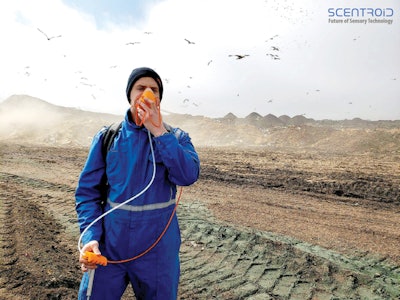
To measure odor you must measure the “psychological response of humans to the olfactory stimuli,” Dr. Ardevan Bakhtari, president of Scentroid, an odor detection technology and solutions company based in Whitchurch-Stouffville, Ontario (Canada), tells Cannabis Business Times.
That subjectivity is what makes handling odor situations difficult, as neighbors might experience cannabis odors differently than cannabis business owners. Responses to odor also may differ among neighbors on the same street or team members in the same company. How can a cannabis business owner resolve a problem they cannot objectively measure? How can courts rule whether a civil or criminal odor-related lawsuit has merit if arguments boil down to “he said, she said”?
One solution is an international standard that has been around for nearly 60 years: an odor panel.
What is an odor panel?
Odor panels are groups of specially trained odor experts, called “odor panelists” or “odor assessors,” who take and measure air samples to determine odor levels.
“A panelist is a ‘trained nose’ that we’ve measured the sensitivity [of] using a known compound,” Bakhtari explains. Panelists are selected through a smell test of n-Butanol, an alcohol that is detectable by 90 percent of the human population when present in concentrations ranging from 20 ppb (parts per billion) to 80 ppb. To put together an accurate panel, “we’re not just looking for a super sense of smell,” says Scentroid’s president. “We’re looking for people who fall within that norm of human detection.”
Humans remain part of the odor detection process because, simply put, no technology can detect and identify smells like the human nose. Indeed, the human nose can distinguish between one trillion odors, according to research published in 2014, orders of magnitude more than even the most expensive odor detection technology can capture, Bakhtari says. In addition to differentiating between odors, the human nose “can detect pollutants at part per trillion levels,” he adds.
How can an odor panel help a cannabis business?
Odor panelists can assist cannabis businesses by conducting odor studies that identify which processes emit the most odors, where those odors are escaping the facility, as well as help with identifying and selecting technology solutions, Bakhtari says.
An odor panelist can also act as an expert witness in court proceedings. In fact, an odor panel is the only evidence accepted by courts in odor-related lawsuits, Bakhtari says. (See p. S7 for more on cannabis odor lawsuits.)
“There is some negativity toward cannabis production,” Bakhtari says. “And it kind of gets ugly, because [opponents] say the odor is very strong, and then an inspector can go and there is no odor. Because you cannot measure it easily, it becomes a ‘he said, she said.’”
Scentroid recently was called to testify at a hearing when a resident sued a Canadian licensed cannabis producer (LP) over odors emanating from the facility. Using an odor study and site visit, the odor panelist was able to prove that “the [LP] was doing everything properly and there wasn’t that much odor,” Bakhtari says.
Because odor is such a powerful sense, Bakhtari advises that cannabis business operators handle any odor complaints quickly and fully. “One of the issues with odor is that because it’s a psychological thing, if there is an actual odor and it lingers, people … will develop a hyper-sensitivity to this odor. So as soon as you get the complaint, try to solve it right away.”
















